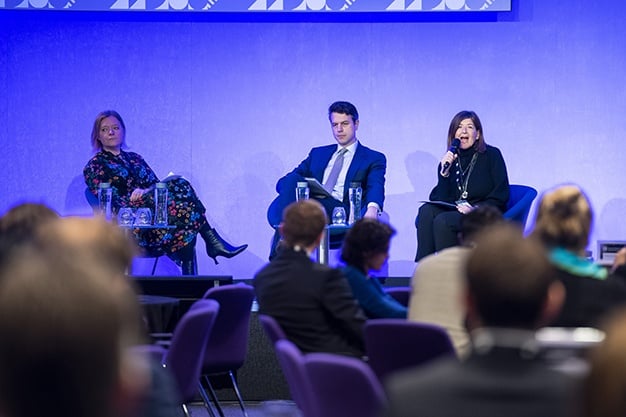Event Report
Rounding off the trio of flagship events in London, the 14th of November 2022 saw Legal Business, The Legal 500, GC Magazine and The In-House Lawyer join forces for the 2022 edition of the Financial Regulatory and Disputes Summit. Returning to the Queen Elizabeth II Conference Centre in Westminster, the event brought together delegates from across the legal profession to discuss the key issues affecting this area of law in uncertain times.
The event was centred around dynamic panels providing hard-hitting insight into the legal issues affecting the financial services industry today, moderated by event sponsors solicitors firms RPC, Ashurst, Milbank and litigation boutique Pallas Partners, as well as elite barristers chambers 3VB and One Essex Court, in addition to litigation PR specialists Maltin PR. Networking sessions were sponsored by Mishcon de Reya, another firm of solicitors.
Kicking off the event, Pallas Partners founder Natasha Harrison delivered the keynote address. Setting out a frank picture of the economic challenges ahead with an optimistic tone on the evolution of the common law in this space, she identified that from a disputes perspective ‘the English courts importantly remain the preferred venue for disputes amongst institutional investors investment banks’, and that ‘notwithstanding the geopolitical financial and economic issues we face, the English court remains a steady hand in resolving disputes from the financial courts, all the way up to the Supreme Court – given what we’re facing as a nation, the next ten years will be a really important time for English jurisprudence, particularly in the financial area.’
Her Pallas colleague Tracey Dovaston moderated the first panel, alongside fellow Pallas litigator Fiona Huntress and James McDonald KC of One Essex Court to provide a helicopter view of the themes. Fiona Huntriss predicted that the much-anticipated wave of corporate insolvency that was expected by many in 2022 is delayed rather than illusory, identifying that ‘the zombie companies have got sticking plasters – they’re still there and that’s to come; because of the cheap money due to economic conditions coming to an end.’ James McDonald KC, identified that ‘we have seen massive fraud claims making their way through the courts at the moment’, pointing not only to his own in the ENRC litigation but the “Tuna Bond” scandal litigation involving Mozambique.
This was followed by a Chatham House rule session, moderated by Lynne Dunne from Ashurst, concerning the senior managers conduct rules, and the issue of how to regulate non-financial misconduct by financial services professionals. Dunne and Ashurst regulatory specialist partner Nathan Willmott, were joined by two senior in-house lawyers from banks, Dan Ison from Barclays and Ajneet Jassey, general counsel at Lloyds Banking Group. Key issues discussed include the approach to be taken by the FCA in the decision by the High Court in SRA v Beckwith, in which the court pushed back on the solicitors’ regulator’s more interventionist approach on lawyers’ private lives. Questions were raised as to the extent to which regulators in the financial space would focus on the individual employee’s actions when focusing on how to handle a bank versus the way in which matters are handled and the organization’s culture. Focusing on the issue about honest and integrity being seen as a fundamental point, and questions about de minimis, one participant identified an example of an elite law firm being brought in to investigate after a senior manager was caught taking two bowls of cereal from a bank’s canteen, but only paying for one.
After a networking coffee break, the next session – again, under the Chatham House rule – saw 3VB’s Saima Hanif KC chair a discussion on the Financial Conduct Authority’s approach to enforcement. Joining her on the panel were Jonathan Peddie, chair of Baker McKenzie’s global financial services industry group, Gayathri Kamalanathan of Slaughter and May, and a special appearance for them the FCA’s own director of retail and regulatory investigations, Anthony Monaghan.
Following this, in the final session before the lunch break One Essex Court took delegates on a deep dive in to the recent and upcoming case law on the critical field of Quincecare jurisprudence concerning a bank’s duty to its customers to not process payment requests when the bank has reasonable grounds to believe it is an attempt to defraud. Charlotte Henschen, a partner at RPC, took attendees through the Nigeria v JPMorgan case, concerning disgraced former Nigerian oil minister Dan Etete’s siphoning of funds held in accounts with the bank and whetting appetites for the case’s hearing just over the road from the QEII Conference Centre by the United Kingdom Supreme Court. Panel moderator Orlando Gledhill KC of the chambers and Clifford Chance partner Kate Scott discussed the Quincecare duty when applied to retail consumers, and analogous other regulations concerning authorised push payment (APP) fraudsters preying on the public.
Group actions were the star of the show after lunch, with Julian Stait of Milbank leading a session on collective redress in financial services disputes. Derek Holt of AlixPartners provided a data-driven approach to the class actions field across the English and Welsh courts. Brian Kennelly KC of Blackstone Chambers, who has been active in a number of cases on the defendant side, identified that ‘things have been going all the claimants’ way in these cases- all the claimant has to show is that the methodology has some basis in fact; the truth is it’s been treated very generously by the Competition Appeals Tribunal’.
Coming days after the collapse of FTX, the next session on cryptoassets chaired by RPC’s Jonathan Cary raised highly topical questions on how to regulate digital assets. Tim Aron, of Minerva Chambers, pointed out that much regulatory work would be inevitably Offshore as, ‘the UK isn’t really ,despite the recent grumbling from the government, particular crypto-friendly – why would you choose to come into the UK with the regulatory uncertainty and the relatively developed regulatory risk if you put a foot wrong? And on top of that, why would you pay 20% or more tax to do it?’. Daniel Hayward-Hughes of offshore firm Walkers raised the prospect of onshore-offshore tugs of war for jurisdiction, stating that ‘a lot of these crypto exchanges have their headquarters incorporated in either the BVI or the Cayman Islands, although arguably they don’t do much actual work in those jurisdictions. When you go and wind up a Cayman Islands or a BVI company, you go to the island to wind them up. And notwithstanding Hong Kong having some recent unusual decisions about taking jurisdiction over BVI and Cayman companies, it is still normally the case that you go to those jurisdictions first, and then you get your recognition in the foreign jurisdiction.’
The final session of the day saw former BBC legal correspondent, now senior partner at Maltin PR, Clive Coleman lead a discussion on the importance of reputation management in litigation. The firm’s founder, Tim Maltin, observed that ‘sometimes the reputations at stake in litigation are particularly bigger than the matter values themselves – you can have a billion taken off the share price if you don’t handle the media correctly when the matter might only be a matter of several million pounds’. Joining them was Suzanne Rab, a barrister at Serle Court, contributed practitioner expertise and identified the CAT proceedings regarding the takeover of Newcastle United Football Club as a case which drew heavy attention from the court’s live feed.
Legal Business, The Legal 500, GC Magazine and The In-House Lawyer would like to thank all those who attended this in-person event, and all those sponsors and panellists who contributed to an excellent day of insight and networking.









